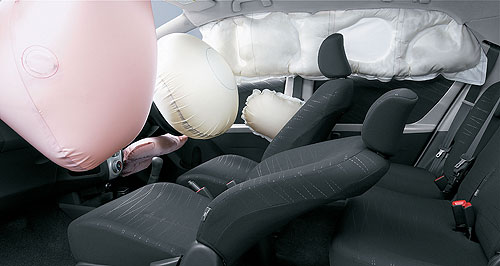News - General News - SafetyACCC pushes for mandatory Takata airbag recallNot quick: The Takata airbag debacle is not only costing motor companies big dollars but also Australian taxpayers, who have to foot the bill for the ACCC to make sure recall repairs are done. Manufacturers not doing enough to fix defective Takata airbags: government22 Sep 2017 By TUNG NGUYEN THE Australian federal government is proposing a compulsory recall of all defective Takata airbag units in a bid to remedy the nearly 2.49 million faulty vehicles on Australian roads that have been called back since 2009. Issued by minister for small business Michael McCormack, the draft recall notice states that “the actions taken have not resulted in a satisfactory rate of removal and replacement of defective Takata airbag inflators to prevent injury in vehicle occupants, despite the lengthy period during which voluntary recalls have been in place”. The fault in some Takata airbags without a desiccant (drying agent) lies in the ammonium nitrate propellant which can, over time and with a build-up of moisture, degrade and lead to a misdeployment resulting in metal shrapnel expelling at occupants and into the cabin. However, the Federal Chamber of Automotive Industries (FCAI) – the peak body representing Australia’s automotive companies – has hit back at the proposal, stating that “we do not agree that this needs to move to the next stage”, while conceding “if this ACCC (Australian Competition and Consumer Commission) proposed recall notice addressed the complacency to act among some owners then this will be a benefit”. The FCAI said that all brands affected by the recall have been doing everything possible to remedy the Takata issue and that identifying and contacting owners is often the biggest hurdle to overcome, not a lack of will to repair vehicles. The rate of repair for identified at-risk vehicles – including models from BMW, Fiat Chrysler Automobiles (FCA) Australia, Honda, Mazda, Ferrari, Mitsubishi, Nissan, Subaru and Toyota – is, according to the ACCC, “only around 38 per cent (approximately 955,500) and in the case of one major manufacturer is only 17 per cent”. Mr McCormack claims that “communication with affected consumers have varied widely between the different suppliers” with some having made “very limited efforts to locate consumers, for example by sending one or two letters to the last known address”. However, Honda Australia was praised in the report by Mr McCormack for aggressively pursuing its owners via text message, emails and phone calls – in addition to the standard method of a letter in the mail – and achieving a repair rate of 78.3 per cent. In July, Australia’s first Takata-related fatality occurred when a Sydney man driving a 2009 Honda CR-V was involved in a collision. However, Honda Australia had sent five letters to the owner over a 16-month period informing him of the airbag’s dangers and that the replacement airbag would come free of charge. There have now been 19 confirmed deaths involving Takata airbags worldwide – 13 in the US, five in Malaysia and one in Australia – as well as over 207 reported injuries which range from the loss of eye sight and severe lacerations to the face, to severed vocal chords and head injuries including brain damage. Mazda Australia has achieved an overall 39.6 per cent repair rate, with 73.3 per cent of its high-risk Alpha airbags already remedied, and believes a mandatory recall will heighten owner awareness. Nissan Australia said: “We welcome the wider community support to encourage consumers to get their Takata airbag inflators repaired.” In addition to the approximately 2.49 million vehicles already called back, the new recall would also encompass around 877,000 vehicles fitted with Takata airbags from manufacturers including Audi, Ford, Jaguar, Volkswagen, Holden, Porsche, Mercedes-Benz and Tesla which were not part of the original voluntary recall. The addition vehicles are identified to have their airbags manufactured in Freiberg, Germany, which is allegedly free from defects, but Mr McCormack cited “six reported incidents of Takata airbag inflators manufactured in Freiberg rupturing” and that affected vehicles were part of a US recall. Under the new proposal, the 150,000 or so identified high-risk Alpha airbags would need to be repaired within one business day of the vehicle owner contacting the manufacturer, while non-Alpha units older than five years will need to be remedied within a month of notification. Car-makers will have until December 31, 2020 to fix airbags no older than six years. Manufacturers will also need to provide a refund to customers if the repair-work cannot be completed within the specified time and alternative transportation cannot be arranged. The car-makers also need to take all possible steps to contact and inform owners, keep records of all repairs and dispose of faulty airbag units in a responsible manner.  Read more14th of September 2017  Mazda, BMW, Citroen, Peugeot, FCA models face recallsTakata risk prompt Mazda, BMW recalls PSA, FCA models called in for other faults26th of July 2017  Honda no longer using Takata airbagsDaicel inflators replace Takata airbags but 42,000 Hondas might need a second recall25th of July 2017  Brands replacing Takata airbags with like-for-like unitsNew Takata airbags expected to be recalled and replaced again within six years |
Click to shareGeneral News articlesResearch General News Motor industry news |















Facebook Twitter Instagram